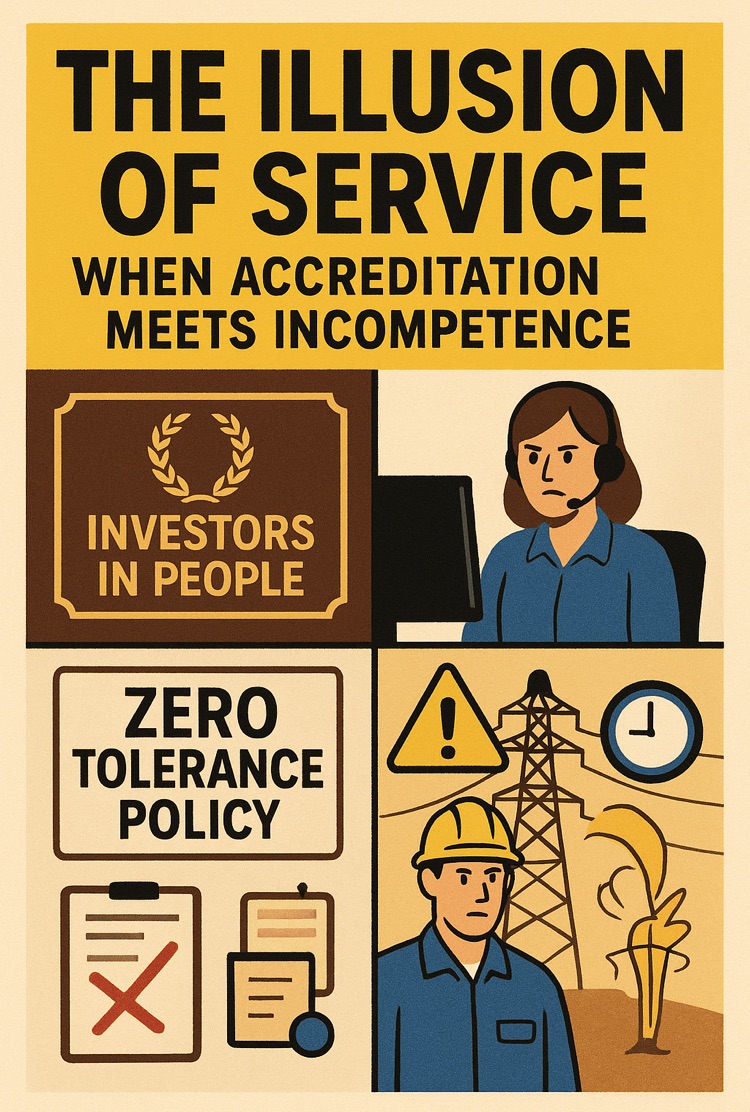Everywhere you look, public and private services plaster their walls with proud declarations: “Investors in People”, “ISO Certified”, “Excellence in Care”, or “Zero Tolerance Policy”. Gold plaques, laminated signs, and glossy awards promise efficiency, accountability, and professionalism. And yet, when it comes down to actual service, the reality often falls far short.
Take, for example, a service with a dedicated results or information line. A customer calls, expecting to confirm important information—something the line exists specifically for. Within minutes, the staff could log into the system and give a clear answer. But instead, bureaucratic rigidity, indifference, and visible annoyance turn a simple request into a battle of patience. Automated messages become the default, and the caller is left frustrated and powerless. A service that promises care becomes a lesson in inefficiency and poor communication.
What makes it worse is the audacity of plastering a zero tolerance policy on the wall a rule presumably aimed at customers while failing to uphold the same standard for staff attitudes. If zero tolerance is meant to enforce accountability, it should apply equally to the people running the service. Staff should treat callers with professionalism, patience, and competence. I mean for real they are the basic requirements of their job. Instead, the human element meant to deliver assistance becomes a source of friction. Perhaps they themselves could benefit from a few customer service lessons.
This is not an isolated case. The systematic failures of essential services are woven into the infrastructure of modern nations:
• Healthcare systems that make it nearly impossible to access your own medical records, scans, or lab results without repeated phone calls, forms, or appointments.
• Government offices with dedicated lines for benefits or permits, yet staff follow rigid scripts that prevent meaningful assistance.
• Emergency services where complaints about response times or negligence are funneled into opaque reporting systems, giving the illusion of oversight but delivering little accountability.
• Public transport or utility providers with customer service hotlines that exist in theory but function in practice as endless loops of automated messages and frustrated waiting.
The common thread? Systems designed to reassure citizens of competency, while in practice, human and bureaucratic failures render them ineffective. Accreditation plaques, awards, and zero tolerance policies signal intention, not execution. Golden signs proclaim “invested in people,” but the lived reality is that people relying on the service are consistently left to navigate incompetence, delays, and indifference.
Perhaps it’s time to recognize a simple truth: signs, certifications, and policies cannot substitute for actual accountability. Real service exists when systems empower individuals to access what they are entitled to, when staff are trained, empowered, and supported, and when processes are designed with people and not procedures at the center. Until then, we’re left staring at gold-plated lies, dialing dedicated lines that don’t deliver, and wondering why essential services continue to fall short in a world that depends on them.
